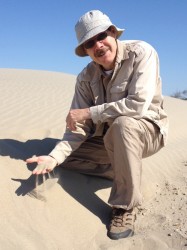Dr. Daniel H. Sandweiss
Professor of Anthropology and Quaternary and Climate Studies,
Cooperating Professor of Earth and Climate Sciences and Global Policy
Ph.D., Cornell University, 1989
M.A., Cornell University, 1983
B.A., Yale University, 1979
Professional Activities:
I am an archaeologist interested in maritime adaptations and climate change in Latin America. Most of my research has been carried out on the desert coast of Peru, but I have also worked in Central America (Honduras and Guatemala) and in Cuba. In Peru, I have excavated early (preceramic) sites, studying climate change and its effects on people. This focus has led to an interest in the prehistory of El Niño, a global climatic perturbation first recognized in Peru and now known to affect weather throughout the world. My research has included developing a variety of techniques for identifying ancient El Niño events. I have also worked on the archaeology of complex, late prehistoric sites in Peru, studying such topics as the role of specialized fishermen in the Inca empire and the nature and function of a major regional center on the north coast. I continue to evaluate the hypothesis that the north Peruvian coast experienced major climate changes involving El Niño frequency at about 5,800 and 2900 years ago.
In 1987 I founded the peer-reviewed publication series Andean Past and continue on the editorial staff. Andean Past was published by the Cornell University Latin American Studies Program through Volume 11 and is now published by the University of Maine as an open access, online journal. I was an editor of Chungara Revista Chilena de Antropología from 2013-2022 and am on the Editorial Boards of Latin American Antiquity, Journal of Island and Coastal Archaeology, Boletín de Arqueología PUCP, and Arqueológicas. Since its founding in 2017, I have been a Co-Chair of the Editorial Advisory Board of the Journal of Archaeology and Education.
I was President of the Scientific Committee for FERCO (Foundation for Research and Exploration on Cultural Origins), a Canary Island foundation, from 1998-2002, and Chair of the Society for American Archaeology’s Committee on the Americas (2004-2008, 2018-2020). From 2005-2007, I was a Sigma Xi Distinguished Lecturer. In 2008, 2012, and 2019 I received Presidential Recognition Awards from the Society for American Archaeology (SAA), in 2016 I received the Rip Rapp Archaeological Geology Award from the Geological Society of America, in 2017 I received the University of Maine Presidential Award for Research and Creative Achievement, and in 2022 I was selected as the Distinguished Maine Professor.
In 2014, I was elected as a Fellow of the American Association for the Advancement of Science, and since spring of 2017 I have been a fellow of the Geological Society of America. I was an elected member of the SAA Board of Directors from 2014-2017 and a member of the Board of the Maine Chapter of the Fulbright Association from 2012-2019 (Vice-President from 2014-2018). In March, 2022, I became the President-Elect of the SAA and began my term as President four months later; I finish in April 2025. At UMaine, I was Dean and Associate Provost for Graduate Studies (2005-2014), Director of the School of Policy and International Affairs (2016-2018), and a Rising Tide Professor (2018-2020).
I served as Chair of the R.S. Peabody Institute of Archaeology Advisory Committee from 2013-2020. Between 2014 and 2024, I was elected sequentially as Northeast Regional Vice President and Board member; Vice-President for Chapter Development, President-Elect, President, and Past President of Phi Kappa Phi National Honor Society. I have been the Vice-President of the Institute for Andean Research Board since 2018. I am the Chief Cooperating Curator of UMaine’s Hudson Museum.
In 2024, I was elected as a member of the United States National Academy of Sciences.
Anyone interested in receiving email bulletins related to Andean archaeology should email me a request to join the Andean list.
I published a short book of photographs from my trips to Latin America. An e-version is available here.

